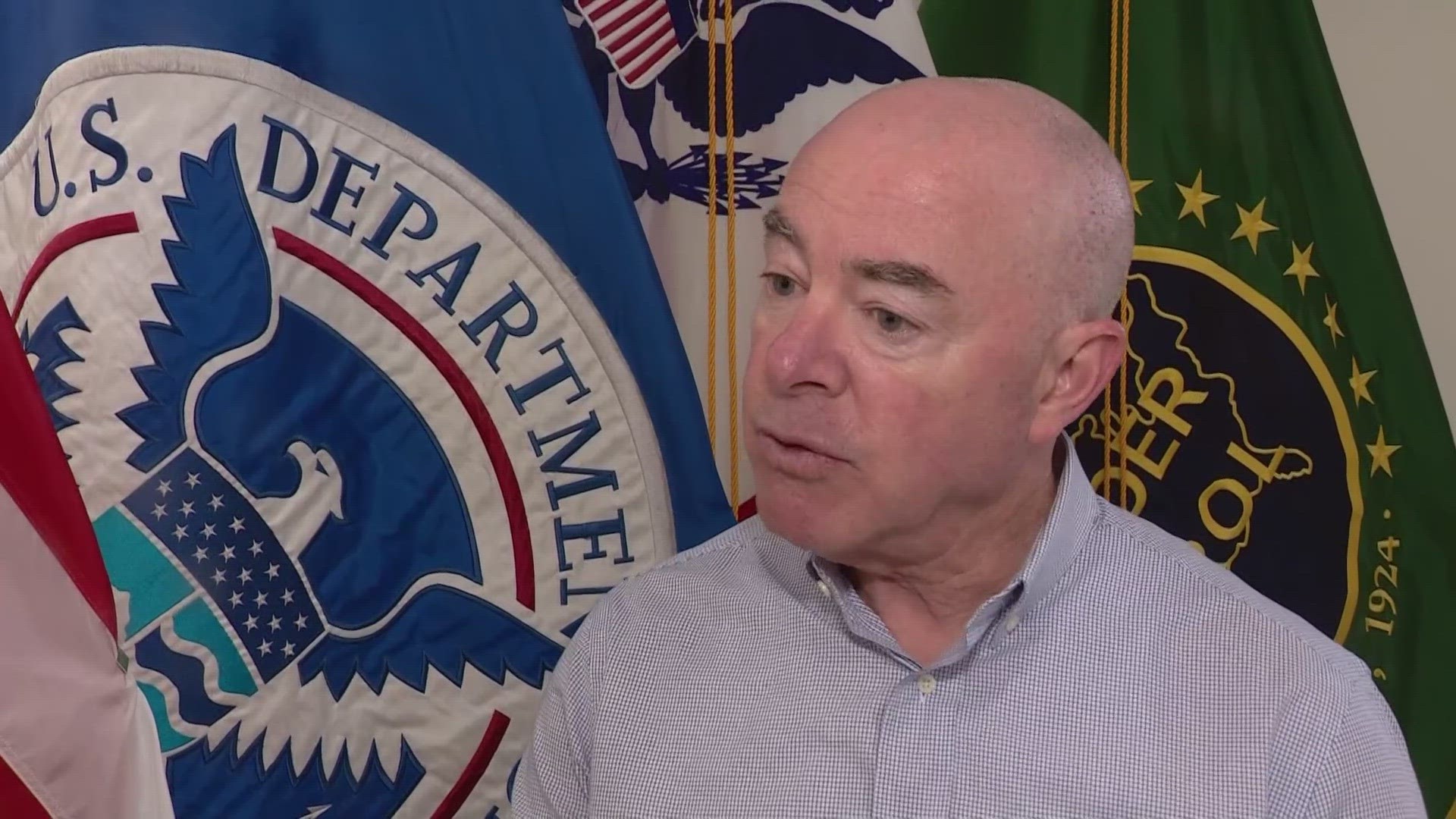EAGLE PASS, Texas — Speaking in Eagle Pass, Texas on Monday, Department of Homeland Security Secretary Alejandro Mayorkas discussed the spike in border crossings seen in December across the southwest border.
“It coincides with the time when Mexican enforcement was no longer implemented. The immigration enforcement agency in Mexico was not funded,” Mayorkas said.
On Dec. 1, the head of Mexico’s immigration agency ordered the suspension of migrant deportations and transfers due to a lack of funds in an internal agency memo. López Obrador later said a financial shortfall that had led the immigration agency to suspend deportations and other operations was resolved, and some deportations were later resumed.
Recently, the number of migrants dropped drastically across the border from a daily average of 10,000 border crossings to 2,500 by the start of January, but Mayorkas remained skeptical about the reason for the sudden drop in apprehensions.
“It is too early to tell whether the significant drop in the number of encounters we have experienced over the past week is a function of the season, the holiday season, or whether it is a function of the fact that the Mexican authorities have resumed their enforcement operations and it very well may be a combination of both,” Mayorkas said.
The migrants on the caravan Monday included single adults but also entire families, all eager to reach the U.S. border, angry and frustrated at having to wait weeks or months in the nearby city of Tapachula for documents that might allow them to continue their journey.
Mexico says it detected 680,000 migrants moving through the country in the first 11 months of 2023.
In May, Mexico agreed to take in migrants from countries such as Venezuela, Nicaragua and Cuba who had been turned away by the U.S. for not following rules that provided new legal pathways to asylum and other forms of migration.
But that deal, aimed at curbing a post-pandemic jump in migration, appears to be insufficient as numbers rise once again, disrupting bilateral trade and stoking anti-immigrant sentiment.
On Thursday, Sen, Ted Cruz (R-Texas) joined U.S. Rep. Henry Cuellar (D-Laredo) in Laredo for a bipartisan call for adding an additional international bridge to increase the flow of commerce between the two countries. They are trying to set a maximum 120-day timeline for the president to decide whether to approve a permit. The previous process used by the Biden administration required an environmental review — which could take years — before the president could decide on a permit.
A new caravan en route
Mayorkas' visit came as a caravan of about 2,000 migrants on Monday resumed their journey through southern Mexico, after participants were left without the papers the Mexican government appeared to have promised.
The original caravan of about 6,000 migrants from Venezuela, Cuba and Central America had started walking on Christmas Eve. But after New Year’s Day, the government persuaded them to give up their march, promising they would get some kind of unspecified documents.
The migrants were seeking transit or exit visas that might allow them to take buses or trains to the U.S. border. But they were given papers that don’t allow them to leave the southern state of Chiapas, on the Guatemalan border.
Migrants set out walking Monday from the railway town of Arriaga, near the border with Oaxaca state, about 150 miles (245 kilometers) from Tapachula, where they started the original caravan on Dec. 24.
Salvadoran migrant Rosa Vázquez said Mexican immigration officials provided shelter in the town of Huixtla, Chiapas, and offered her papers that would have allowed her to remain in the state.
But work is scarce there and local residents are also largely impoverished.
“Immigration lied to us, they made promises they did not live up to,” said Vázquez. “They just wanted to break up the group, but they were wrong, because we're all here and we're going to start walking.”
Coritza Matamoros, a migrant from Honduras, was also taken to a local shelter along with her husband and two children, even though she thought she was being sent to Mexico City.
“They really tricked us, they made us believe we were being taken to Mexico City,” said Matamoros. “They made us sign documents.”
For the moment, the caravan hopes to make it to a town further up the road in Oaxaca.
Mexico has in the past let migrants go through, trusting that they would tire themselves out walking along the highway. No migrant caravan has ever walked the 1,000 miles (1,600 kilometers) to the U.S. border.
U.S. officials in December discussed ways Mexico could help stem the flow of migrants at a meeting with Mexico's president Andrés Manuel López Obrador.
López Obrador has confirmed that U.S. officials want Mexico to do more to block migrants at its southern border with Guatemala, or make it more difficult for them to move across Mexico by train or in trucks or buses — a policy known as “contention.”
The Mexican government felt pressure to address that problem, after U.S. officials briefly closed two vital Texas railway border crossings, claiming they were overwhelmed by processing migrants.
That put a chokehold on freight moving from Mexico to the U.S., as well as grain needed to feed Mexican livestock moving south. The rail crossings have since been reopened, but the message appeared clear.

